Iran in the Syrian conflict. The confrontation with Saudi Arabia and the interests of the Shiites
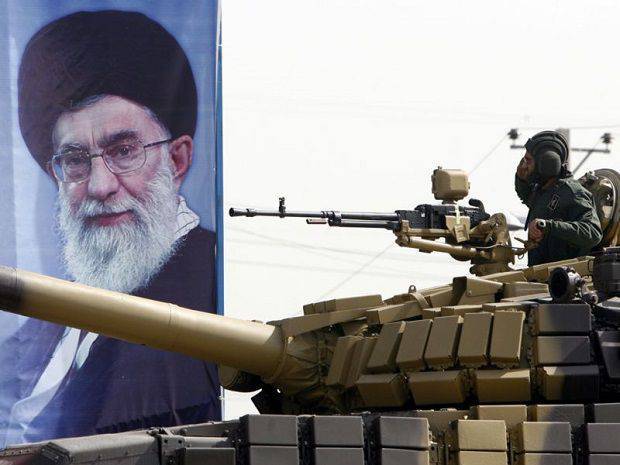
Iranian presence in Syria: advisers or full units?
On October 14, 2015, Syrian Information Minister Omran al-Zoubi, who was interviewed by al-Mayadin TV channel, denied numerous reports of the entry of Iranian troops into Syrian territory. According to the official, only Iranian military advisers are present in Syria, there are no foreign ground troops in the country - neither Iranian nor Russian. Thus, the representative of the Syrian leadership once again confirmed the official line of the Bashar al-Assad government - Damascus enjoys the military-technical, informational, consultative support of a number of allied states, but the Syrian regular troops and militias carry out direct military operations against extremist groups. It should be noted that since September 30, 2015, at the official request of the legitimate Syrian President Bashar Assad, the Russian armed forces, more precisely, the Aerospace Forces of the Russian Federation, which delivered at least 450 air strikes on positions, are participating in the anti-terrorist operation in Syria militants of the “Islamic State”, destroying 300 armed people, training camps and command posts, supply infrastructure and rear facilities. Also, 26 missiles on the positions of the "Islamic State" were launched from ships of the Caspian flotilla.
But aviation support and missile strikes from ships, causing serious damage to the Islamic State and other radical groups, are good if they are inevitably followed by land operations to destroy terrorists. Meanwhile, the Syrian army, which for several years has been fighting against radical groups of the "opposition", suffers heavy human losses, needs replenishment of weapons, as well as military specialists who could serve modern high-tech weapon (the Syrian army has few such specialists - the vast majority of Syrian troops were trained on obsolete Soviet-made military equipment). For the Syrian army, the presence of foreign troops providing effective assistance in the fight against the enemy would be good support, but so far the country's leadership has maintained the position that the Syrian people can cope with the terrorist threat, using, first of all, their own soldiers. Although, of course, foreign military experts do not stand aside from the events. Western media are actively disseminating information about the participation in the battles on the side of Assad of the Lebanese Shiite organization Hezbollah (Shiites are historical opponents of the Sunnis, and in the current situation in the Middle East, the confrontation between representatives of two areas in Islam has again intensified), as well as the Iranian Islamic Revolutionary Guards Corps (IRGC).
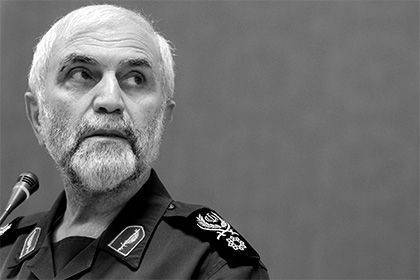 Again, Reuters reported the death of October 8 in battles in northwestern Syria, near the city of Aleppo, Iranian General Hossein Hamedani. General Hossein Hamedani was one of the main military advisers to Syrian government forces. This experienced Iranian soldier, a veteran of the Iranian armed forces, took part in the Iran-Iraq war in 1980-1988, commanding the combat operations of the Iranian troops. Hamedani served in the Islamic Revolutionary Guard Corps, and arrived in Syria to assist the government forces fighting on the side of Bashar al-Assad as an adviser. After only four days, on October 12 2015, in Syria, two other high-ranking officers of the Islamic Revolutionary Guard Corps, Major General Farshad Hasunizade and Brigadier General Hamid Mokhtarband, died in the fighting.
Again, Reuters reported the death of October 8 in battles in northwestern Syria, near the city of Aleppo, Iranian General Hossein Hamedani. General Hossein Hamedani was one of the main military advisers to Syrian government forces. This experienced Iranian soldier, a veteran of the Iranian armed forces, took part in the Iran-Iraq war in 1980-1988, commanding the combat operations of the Iranian troops. Hamedani served in the Islamic Revolutionary Guard Corps, and arrived in Syria to assist the government forces fighting on the side of Bashar al-Assad as an adviser. After only four days, on October 12 2015, in Syria, two other high-ranking officers of the Islamic Revolutionary Guard Corps, Major General Farshad Hasunizade and Brigadier General Hamid Mokhtarband, died in the fighting. Rivalry with Saudi Arabia
The interests of Iran in Syria are quite understandable. Since the Islamic Revolution and the establishment of the Islamic Republic, Iran has remained one of Saudi Arabia’s key rivals for influence in the Middle East. Previously, a third center of power operated in the region — Arab secular nationalist regimes of socialist orientation — Iraq and Syria, supported by the Soviet Union. However, then the regime of Saddam Hussein in Iraq was overthrown by the American invasion, and Iraq itself virtually ceased to exist as a single state and was plunged into the abyss of civil war. A similar scenario the US and the allies tried to implement in Syria, but here the situation was somewhat more complicated. Bashar Assad is still both a politician and a man who is undoubtedly more attractive than Saddam Hussein. It is difficult to accuse him of totalitarian manners, reprisals against the civilian population, so he still enjoys the support and sympathy of not only his co-religionists - the Alawite and political allies of Russia, Iran and the Lebanese Hezbollah, but also of influential political forces in Western Europe. On top of that, Syria had a stronger and more efficient army, which for several years now has not allowed the militants of radical organizations to subordinate the entire territory of the country to their control. Well, the United States and the allies so far refrain from direct armed invasion of Syria, preferring to act with the hands of the so-called. "Syrian opposition." Now Syria remains the last anti-Saudi and anti-American bastion in the Arab world. After the series of uprisings that took place in 2011, most of the political regimes established as early as 1970-1980 (and even in 1960-s) were overthrown. The political situation in Egypt, Tunisia, and Yemen was destabilized, a bloody civil war began in Libya, and the country was actually divided into spheres of influence of individual political, religious and tribal groups. If the Assad regime falls in Syria, the positions of the same Iran will be irreparably damaged. It is this bleak prospect that does not leave Iran with any other behaviors except speaking in support of Bashar Assad.
Iran is the main ideological, military-political and economic adversary of Saudi Arabia in the Middle East. First, Iran is the recognized leader of the Shiite world, and also has authority as an advocate for Shiites and Shiite interests in those countries where Shiites are in the minority. The complexity of the situation in the Middle East is caused, among other things, by the mixed composition of the population - in a number of countries in the region not only Sunni Muslims live, but also large Shiite communities that are closely associated with Iran. Shiites make up the majority of the population in Iraq, and in the same Syria, the Shiites, although they are in the minority, but control all the levers of power in the country (as early as 1973, the Alawites, to whom the Assad family belongs, were recognized by the Imam Musa Sadr as Shiites, and a little later, the Alawites to Shiism recognized Iran). In addition, Shiites make up a large part of the population in Lebanon, where their large armed Hezbollah forces operate, supported by Iran. In Bahrain, Kuwait, Yemen, Turkey, and even Saudi Arabia, there are also numerous Shiite communities under the ideological and political influence of Iran. Relying on the support of Shiite communities, Iran has an excellent opportunity to influence the politics and economy of the Arab countries of the Middle East and even Turkey. Naturally, for the Sunni countries, the Shiite minorities on their territory pose a great danger, since they are agents of Iranian political and economic interests. In Saudi Arabia, Shiites live compactly just in the “oil-rich” provinces, which creates additional threats for the Saudi authorities to the economic well-being of the country in the case of organizing religious unrest.
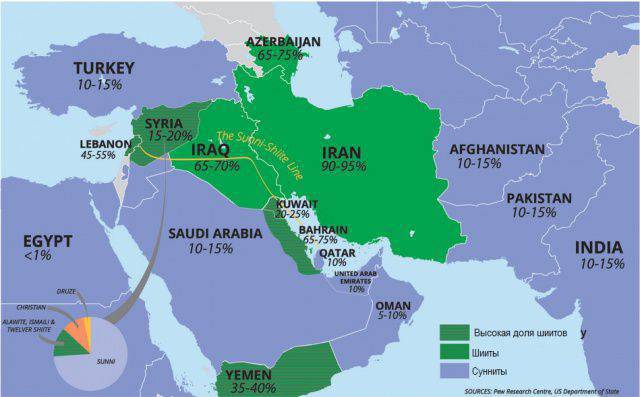
By the way, the Shiites of Saudi Arabia are not so small in number - they make up at least 15% of the kingdom’s population. In the large centers of the Eastern Province of KSA - Dammam, Al-Zahran, Al-Khufuf, Al-Katyf, Shiites make up half the population, about 30 thousand Shiites live in the capital, Riyadh. It should be noted that in addition to the Shiite Arabs - the indigenous population of Saudi Arabia, there are people from Iran, Yemen, India and Pakistan living in the country, who also profess Shiism in its Imami and Ismaili interpretations. Naturally, the Shiites are in opposition to the moderate wing of the Salafis, who rule Saudi Arabia. Representatives of other trends in Islam have no influence on political decision-making in Saudi Arabia and, in fact, are in the position of political marginalized, isolated from real participation in the system of government. Since the place in the social hierarchy in the countries of the Persian Gulf is determined, first of all, by religious affiliation, minority Shiites experience not only religious, but also social discrimination. Growing unemployment (and in Saudi Arabia, according to some data, it covers up to 20% of the country's population), a decline in the standard of living of the country’s population and other economic problems inevitably affect the social situation of the Shiites of Saudi Arabia. Conflicts between Shiites and Sunnis periodically occur, and the power always takes the side of the Sunnis - not only because it sees the Shiites as a danger to the existing system, but also because of traditional tribal ties that are very strong in Saudi Arabia. Strictly speaking, Shiites in the kingdom became more active in 1979, since the Islamic revolution in Iran gave a very strong impetus to Shiite communities throughout the Middle East, showing the possibility of a complete political transformation of the state in a Shiite revolution. In the same city of 1979 the eastern provinces of Saudi Arabia were covered by mass demonstrations of Shiites, demanding respect for religious rights and freedoms, improvement of living conditions in areas inhabited by Shiites, etc. In 1987 was Mass clashes occurred in Mecca caused by an anti-American demonstration organized by pilgrims from Iran with the support of local Shiites. As a result of the dispersal of the demonstration, Saudi troops killed about 400 pilgrims. Escaping from the repressions that followed, a significant part of the Saudi Shiites, especially intellectuals and clergy, who had political influence on the Shiite community, emigrated from the country. So Saudi Arabia received the most powerful centers of anti-government propaganda in Western countries, where the Saudi Shiites formed diasporas. In 1990-ies. persecution of Shiites in Saudi Arabia continued. In particular, in 1996 New repressions against the Shiites began, the cause of which was an explosion at the American military base in Khobar, where 19 American servicemen died. The Saudi authorities accused the Shiites of involvement in the terrorist act, among whom there were mass arrests. In 2006 was In the eastern provinces of Saudi Arabia, there were clashes between Shiites and the police, caused by festive demonstrations organized by the Shiite community in honor of Hezbollah, which is conducting military operations against Israel. As a result of the crackdown on the demonstration, the police detained a large number of Shiites, who were thrown into jails without trial. The most radical Saudi Shiites do not conceal that their goal is to create an independent Shiite state in the eastern provinces of Saudi Arabia and in the territory of Bahrain. Naturally, such an idea itself horrifies the power of the kingdom, since Shiites inhabit the most economically interesting provinces of the country. The creation of a Shiite state and its separation from Saudi Arabia will be the end of the welfare of the Saudis. This is well understood by the Iranian leadership, which patronizes Saudi and Bahraini Shiites and strongly supports them, including against repression by the authorities of Saudi Arabia and Bahrain. Skillful actions on the part of Iran can significantly destabilize the situation in Saudi Arabia, which the Saudi monarchs fear most.
Yemen: Saudi army shows low level
Iran, Turkey and Saudi Arabia possess the strongest armed forces in the Middle East. However, if Turkey so far prefers to focus exclusively on solving the “Kurdish question” on its territory and in the adjacent regions of Syria and Iraq, then Saudi Arabia is already participating in military operations against Shiites - in Yemen. Recall that Shiites - Zaidis (followers of Zeid ibn Ali (grandson of the third Shiite Imam Hussein) make up just under half of Yemen’s population. Before the 1962 revolution, a kingdom created by the Zeidit imams existed in 2004. The king Ahmed was overthrown by local Arab nationalists with the support of the Nazer of Egypt, and Yemen proclaimed a republic. Since that time, the Zaydits lost considerable influence in the country, but did not give up hope for the revival of the Imamate. in the north of Yemen, uprisings organized by local Shiites, the Zeidites, flared up. uprising against the Yemeni government.On the name of the spiritual leader, the rebels and nicknamed “Hussites.” Although Hussein al-Husi himself was soon killed, the uprising continued and under the control of the Hussites there were vast territories of Yemen. In 1956, the Hussits took part in the overthrow of the Yemeni President Ali Abdullah Saleh, but the new Yemeni authorities did not suit them either, as a result of which the Hussites continued their armed struggle again.
At the beginning of 2015, the Hussites seized the capital of Yemen, Sanha, and announced the creation of a Revolutionary Council, whose president elected Muhammad Ali al-Husi. Saudi Arabia and its allies, the “oil monarchies” of the Persian Gulf, are blaming Lebanon Hezbollah, Syria and, of course, Iran for supporting the Hussites. At the request of Yemeni President Mansour Hadi, overthrown by the Hussites, Saudi Arabia in March 2015 announced the start of an armed operation against the Hussites. So the kingdom was embroiled in an armed confrontation, which became religious. On the side of Saudi Arabia were its main allies in the Arab world - Bahrain, Qatar, Kuwait, the United Arab Emirates. Also the side of Saudi Arabia was taken by countries with a predominantly Arab-Sunni population - Egypt, Jordan, Morocco, Sudan. In turn, the Hussites supported Iran. Apparently, initially the Saudis and their allies hoped to quickly suppress the resistance of the poorly trained and poorly armed Hussite troops and restore the power of the controlled regime of Abd Rabbo Mansur Hadi in Yemen.
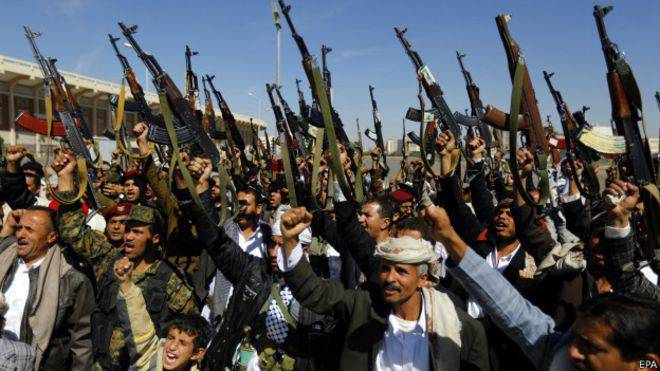
However, air strikes did not lead to the fall of the Hussites, after which Saudi Arabia and its allies were forced to proceed with the land operation. But even here, despite the superiority of the Saudi coalition in armament, technical equipment and professionalism of military personnel, the Yemeni Hussis managed not only to adequately protect the areas they controlled, but also to transfer military operations to Saudi Arabia. The fact is that the borders between Yemen and Saudi Arabia, passing through the desert, are in fact “transparent” and representatives of the same Arab tribes that inhabit neighboring areas of Yemen live in the border areas of Saudi Arabia. Therefore, the Hussites have a very fertile ground for transferring the conflict to the territory of Saudi Arabia. It should also be borne in mind that a significant part of the personnel of the armed forces of Saudi Arabia are Yemeni Arabs, who do not seek to fight against fellow countrymen. Some units, staffed by Yemenis, even left the battlefield, refusing to enter into a confrontation with the Hussites. In early September, 2015 attacked the attacks of armored units of the UAE army, and a high-ranking military from the United Arab Emirates army was killed as a result of the missile attack. Failures in Yemen forced the command of the armies of Saudi Arabia and the United Arab Emirates, which bore the bulk of the fight against Hussites, to request assistance from Qatar and Kuwait, which in September 2015 also announced a significant strengthening of their military contingents in Yemen and sending to the Yemeni front »Weapons and ammunition.
The conflict in Yemen has affected military-political stability and Saudi Arabia itself. The kingdom, as is known, includes the province of Najran, located in the south-west of the country and bordering Yemen. The Banu-yam tribe lived here for a long time, which the Saudi kings did not succeed in conquering even after the province of Najran was rejected by the Saudis from Yemen in 1931. Therefore, Saudi Arabia invited the Banu-Yam tribe to lay down their arms in exchange for guarantees of certain rights and freedoms. So in the composition of Saudi Arabia was a semi-autonomous region, living in fact by its own rules. However, the residents of Najran themselves are convinced that the Saudi leadership does not comply with the terms of the treaty eighty-five years ago and discriminates against the indigenous people of the province. In 2000, an armed uprising against the Saudi monarchy broke out here. Although the uprising was suppressed by Saudi troops, the Banu-Yam tribe harbored a grudge and declared itself at the first opportunity. In 2015, after the start of Saudi Arabia and the allies of the military operation in Yemen, the separatists of Nejran entered the fighting on the side of the Huthis - against the Saudi government forces. The rebels from the organization "Ahrar En-Najran" captured the military base of Saudi Arabia El Mashalin. The rebels also appealed to the command of the Houthit armed forces with a request for assistance in training their own military personnel with knowledge of the operation of weapons and military equipment.
The actions of the Hussites in Yemen detract from the considerable power potential of both Saudi Arabia and the countries of the Persian Gulf, as well as radical Islamist organizations whose militants are fighting against the Hussite militia. In the event of the defeat of the Hussites and the pacification of Yemen, the Al-Qaida and other Salafi militants will move to Syria and Iraq, becoming an additional reinforcement to the Islamic State operating in Mesopotamia. Therefore, while the Hussites are fighting in Yemen against Saudi Arabia, both Iran and Syria win. It is not by chance that the Saudis accuse Bashar Assad of supporting the Hussite uprising. It is likely that without the Hussite uprising, Saudi Arabia and the Allies would have participated in the Syrian civil war far more extensively, but at the moment they are bound by the “Yemeni problem”, especially since the war may spread from the territory of Yemen to Saudi Arabia, and only to remote border areas, but also throughout the country as a whole, becoming the expression of the long-standing contradictions of the rich Sunni regions and the poor, but oil-rich, eastern provinces inhabited by Shiites. Yemeni Hussites will find in Saudi Arabia active supporters in the face of Saudi Shiites, who negatively assess the rule of the Saudi dynasty and its behavior towards the country's religious minorities. In fact, the intensification of Hussites in Yemen led to the fact that Saudi Arabia, Qatar, Kuwait, Bahrain and the United Arab Emirates found themselves in the “schini ring”. From the northeast, across the bay, is Shiite Iran, in the southwest Yemenite Hussites fight, in the northwest Lebanon’s Hezbollah, plus Shiites live in each of these states, which can also be used by Iran in case of open confrontation with the Saudis.
The failures of Saudi Arabia in Yemen revealed all the weaknesses of the military machine of Riyadh. Saudi Arabia’s financial well-being, which allows it to acquire the latest weapons and military equipment, does not mean that well-armed and equipped Saudi units are highly combat-capable. First, we must not forget that the Saudi army is recruited by recruiting mercenaries for military service. For a long time foreign mercenaries served in the Saudi army in general, because Saudi Arabs did not want to go to military service - the standard of living in the country and so allowed them to exist comfortably without being associated with military service deprivation. As a result, a significant part of the Saudi army consisted of mercenaries from neighboring Yemen - Yemeni Arabs, distinguished by militancy and courage. But, as shown in the hostilities launched in Yemen, Saudi Arabia was unable to rely on Yemen’s mercenaries. There are cases when the soldiers refused to fight against their fellow tribesmen and left the guards and bases guarded by them. Secondly, the high level of welfare of the Saudi population in recent decades has changed the very attitude of the inhabitants of the kingdom to death, to human losses. The soldiers of the Saudi army are not ready to give their lives, even for very good money, which distinguishes them from the radical Shiites, who are fighting not for money, but for the idea and their own, quite tangible, vital interests. Finally, the Saudi army, being recruited according to the principle of hiring, is actually deprived of a full-fledged mobilization reserve. And it is unlikely that Saudi youth, especially from the regions of the country that are in conflict with Riyadh, will be eager to be called up for military service and risk their lives in Yemen or, especially, in Syria. The defeats that the Saudi army bears in Yemen clearly demonstrate the real, and not the declared, level of its combat capability.
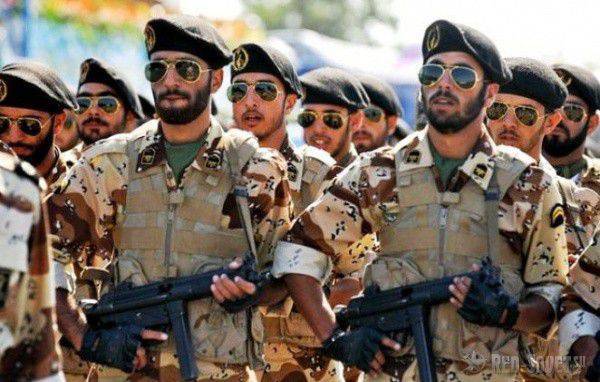
Guards of the Islamic revolution and Hezbollah save Syria?
The potential of the armed forces of Iran is not comparable with Saudi Arabia. Despite the fact that Saudi Arabia finances its armed forces at the highest level and spends billions of dollars from oil sales for their maintenance, Iran, a significant part of which is outdated and inferior to Saudi weapons in its characteristics, takes on a number of armed forces and ideological motivation soldiers and officers, and, most importantly, an effectively functioning mobilization reserve system. The armed forces of the Islamic Republic of Iran, as is known, consist of two key components - they are the armed forces proper, including ground forces, the Air Force and Navy, and the Islamic Revolutionary Guards Corps, which also includes ground forces, the Air Force and the Navy. At one time, Ayatollah Montazeri defined the Islamic Revolutionary Guard Corps as "the brainchild of the Islamic popular revolution and is the only one of its kind with broad religious, political and military powers." The supreme commander of the Corps is considered the “rahbar” - the head of the Iranian state, Ayatollah Khamenei. The immediate command of the corps is the commander-in-chief (since 2007, this post is occupied by Major General Mohammad-Ali Jafari, who previously commanded the land forces of the IRGC). In contrast to the "conventional" armed forces, the financing of the IRGC and its supply with weapons, ammunition, uniforms is carried out at a higher level, because to a certain extent it is the IRGC that is the "face" of the Iranian Islamic revolution in the Middle East and the embodiment of Iranian military power.
It is the Islamic Revolutionary Guard Corps, recruited from among volunteers, that performs important government tasks to support Shiite armed formations in Yemen, Lebanon, and Syria. The Basij-i Mostozafin (Mobilization of the Oppressed) militia is under the control of the Islamic Revolution Guards Corps (IRGC). The national militia includes several hundred battalions, totaling 300 thousand. In the militia are men aged from 12 to 60 years. In the event of the outbreak of hostilities, the militia will be the first echelon of the mobilization reserve of the Iranian armed forces. According to the mobilization plans of the Iranian leadership, in time of war, the country will be able to put under the gun more than 20 million people. That is, in fact, it has the largest mobilization reserve in the Middle East and Saudi Arabia, in the event of a direct clash with Iran, according to many experts, will suffer an inevitable military defeat - even with good armament, financing and logistics. It should also be noted that the fighters of the Islamic Revolutionary Guard Corps undergo a “battle run-in”, participating in armed conflicts in the Middle East - in Yemen and Syria. The Iranian presence in Syria is carried out with the help of the Islamic Revolutionary Guard Corps.
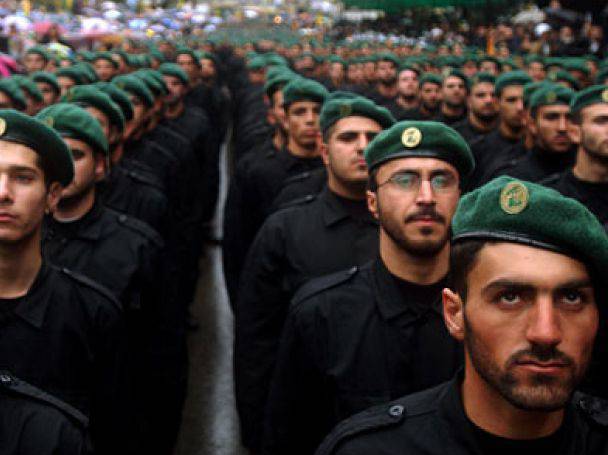
However, Iran has another “interest guide” in Syria - the Lebanese Hezbollah, which experts assess as one of the most organized, disciplined and effective military-political forces in the Middle East. Today, Hezbollah is actively manifesting itself in Syria, standing up for the government of Bashar al-Assad. Meanwhile, two decades ago, Hezbollah, operating in Lebanon, relied on financial and material and technical assistance from Hafez al-Assad, who then headed the Syrian Arab Republic. Now Hezbollah militants are responding with help and assistance to the son of the late Hafez Bashar in the fight against radical Sunni groups.
The creation of the Hezbollah movement itself was the direct result of the intensification of pro-Iranian forces in the Arab world, namely in Lebanon. In 1982, with the help of advisers from the Islamic Revolutionary Guards Corps, an organization called Hezbollah, that is, the Party of Allah, was formed in Lebanon. It set itself the goal of completely eliminating all the remnants of the colonial past in Lebanon and turning the country into an Islamic republic like Iran. Gradually, relying on Iranian support, Hezbollah has become one of the most active anti-American and anti-Israeli armed organizations in the Middle East. According to the UN Security Council resolution, in May 2000, after the withdrawal of Israeli troops from the territory of Southern Lebanon, Lebanese regular army units were supposed to enter there, but the Lebanese government actually placed the southern areas of the country under the administration of Hezbollah. Along the Lebanese-Israeli border, powerful border fortifications were created, platforms for the installation of multiple launch rocket systems were equipped. In fact, Hezbollah is a small and well-armed army, staffed by ideologically motivated fighters. Israeli security services in 2004 determined the number of Hezbollah in about 4 thousand regular fighters and about 5 thousand reservists. Regular units are summarized in 10 motorized and 6 infantry battalions, approximately 200-250 fighters in each. Throughout its existence, Hezbollah was used to defend Iranian interests in Lebanon and beyond, and in 2011, due to the outbreak of hostilities in Syria, Hezbollah expressed support for the government of Bashar al-Assad and began to participate in military operations on the side of the Syrian government troops. At the same time, Hezbollah stepped up support for the Shiite opposition in Bahrain, which led the king of Bahrain to take a decision to ban Hezbollah in 2013.
On the territory of Syria, Hezbollah appeared in the spring of 2012, when a small detachment of militants of the organization was transferred to Syria Zeinab in Damascus to protect the Shiite cult site. However, by the summer of 2012 More and more numerous reinforcements in the face of the Hezbollah militants began to arrive in Syria. It is known that the organization almost independently planned and carried out an operation to liberate the city of Al-Qusaur, which was in the hands of religious extremists. During the liberation of the city, at least 200 fighters of Hezbollah were wounded and injured, and the total number of members of the organization who took part in the storming of the city was about 1000 people. Further involvement of Hezbollah in the Syrian conflict was provoked by the Salafis themselves. After August 17 2013 in the Shiite district of the Lebanese capital of Beirut, an explosion thundered, the victims of which were 27 dead and injured 300, the radical Sunni organization that claimed responsibility for this was a warning to all Hezbollah members and Lebanese Shiites fighting in Syria on Bashar al-Assad’s side. After that, the leader of Hezbollah, Sheikh Hassan Nasrallah, said that he was personally ready to go to war in Syria. Naturally, after such a statement, the number of Hezbollah fighters fighting in Syria began to grow. The organization took control of large areas, focusing primarily on the defense of the towns and villages inhabited by Shiites north of Aleppo and in the south of Syria - in the province of Daraa. Hezbollah units were also stationed in the eastern districts of Damascus, in the cities of Idlib and Hama. Hezbollah units, together with Syrian government forces, participated in the liberation of the city of Homs and the destruction of the opposition fighters defending it. In November, the 2013 Hezbollah took part in hostilities on the Syrian-Lebanese border, with the aim of destroying the rear bases of the militants of the opposition and blocking the channels of aid through Lebanese territory. Up until the end of April 2014 units of Hezbollah fought against militants of opposition groups on the Lebanese border, until they achieved a final victory over the enemy and control over border areas. Currently, Hezbollah fighters continue to defend a number of Shiite settlements, including those surrounded by Islamic State militants. Naturally, such an active participation of the organization in hostilities is reflected in the losses of its personnel, including, including, the top leaders of Hezbollah. So, back in September 2012. in Homs, Ali Hussein Nassef (aka Abu Abbas), who commanded all Hezbollah units in Syria, was killed in Homs. In January, the 2015 Jihad Mugniyah, the eldest son of the well-known former chief of intelligence and counterintelligence of Hezbollah Imad Mugnii, was killed in the bombing of Israeli aviation. Mohammed Isa, who was responsible for Hezbollah’s activities in Syria and Iraq, also died.
Of course, Hezbollah is pursuing its goals in Syria, namely, expanding the organization’s area of activity by joining the Syrian Golan Heights to South Lebanon, which is controlled by Hezbollah. It turns out that the whole band of the old colonial Levant is under the control of the allied forces - these are the regions inhabited by the Alawite in the region of Latakia and Tartus, southern Lebanon, the Syrian Golan Heights. Hezbollah is fighting stubbornly against the Sunni organization Jabhat al-Nusra, which also has a certain influence on the Syrian Golan Heights. The ousting of militants of Sunni organizations from the Golan Heights is one of Hezbollah’s priorities. The organization also explains its actions by the need to protect the controlled territory from a possible Israeli attack, which is accused by Hezbollah leaders of invading plans for Lebanese and Syrian territories.
Thus, we see that Iran and the Lebanese Shiite party Hezbollah that it patronizes actively participates in the armed conflict in Syria on the side of the government troops of President Bashar al-Assad and make a tangible contribution to the victory over the Islamic State and other similar organizations. However, it’s still premature to talk about Iran’s full-scale entry into the war against the Islamic State and the Syrian “opposition”. It is unlikely that Iran, which has its own interests both on a regional and global scale, will in the foreseeable future fully enter into conflict and use its regular armed forces in Syria, with the exception of individual units of the Islamic Revolutionary Guard Corps. At the same time, a change in the military-political situation in Mesopotamia and the Arabian Peninsula can lead to the most unexpected consequences. For example, the defeat of the Hussites in Yemen can lead to the transfer of radical militants to Syria and Iraq, as well as to the “liberation” of a significant part of the Saudi army, which can also take part in the events in Syria - only on the side of the anti-Assad opposition.
The organizations Al-Qaida and the Islamic State mentioned in the material are included in the Unified Federal List of organizations recognized as terrorist in accordance with the legislation of the Russian Federation. Their activity on the territory of the Russian Federation is prohibited.
Information